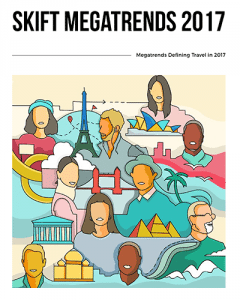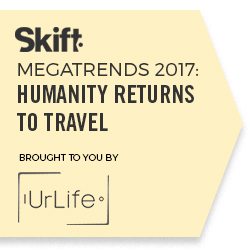Skift Take
Hospitality is all about the very human trait of empathy. And businesses need to remember that humans should remain front and center to create incredible experiences, helped — but in no way supplanted — by modern technology.
Yesterday we released our annual travel industry trends forecast, Skift Megatrends 2017. You can read about each of the trends on Skift, or download a copy of our magazine here.
Download Your Copy of Skift Megatrends 2017
This Megatrend is brought to you in partnership with UrLife.
Back in early 2014, Skift came out with a new report and framework for looking at the digitally adept traveler, what we called “The Rise of the Silent Traveler.”
This is how we described it: “The rise of digital has given rise to a new kind of traveler adept at all available online and mobile tools, and uses them to jump across all industry-defined silos. These new travelers don’t need tons of handholding, they shun human interaction, and know their way around everywhere they go. This presents the global travel industry a paradox: the human part of the service economy may become less and less important.”
Jump three years ahead, and you can see the extreme effects of digital-led life: the casual tyranny of pervasive connectedness, constant virtual stimuli and hyper distractedness have taken over our lives, and it is even more pronounced when we travel. People are overwhelmed and all of this has happened as tech as a differentiator for travel brands is becoming more of a hamster wheel, and increasingly becoming commoditized.
In summer of 2016, Skift dove deep into the habits of Supertravelers, those early-adopter, avid, and demanding travelers, mainly because we see them as a mirror to the larger changes happening in consumer behavior — especially digital habits — and how they get reflected and fulfilled in travel.
The biggest lesson learned from talking to the high maintenance, highly connected travelers?
They want the humanity back in travel.
These travelers have more power in their iPhones than most airlines had in a mainframe 30 years ago, but that doesn’t mean they want to be left to navigate this giant world all alone after all.
The travel brands should strive to understand how the experiences they provide make travelers feel. Travel is a huge investment of time and money; travelers will forget what companies offer through tech, what they say in their ads, but they will never forget how these travel brands make them feel.
The concept of big data has trickled down to the average consumer, and now they want to see what giving up all this personal information can get them, and they want the good news delivered by people, not apps (except sometimes they want them, too).
Smart brands have to learn to combine technology and customer service in a way that pairs digital efficiency with human intelligence.
All of the data in the world is much more powerful when placed in the hands of a well-trained, empathic person who can anticipate, be flexible, and help steward a cohesive experience. To succeed in this, the travel industry must not look to the temptations of AI and automation in order to provide something novel. Rather, they should focus more deeply on training staff and creating a human-centric, empathetic experience.
It’s great to compare prices using Kayak, Google, or Skyscanner and to read the TripAdvisor reviews, but when the bartender remembers that you prefer a particular brand of organic tequila with 100 percent pure blue agave, or the hotelier, without asking, recalls that steak and eggs with a mimosa is your breakfast of choice, then you’ll keep coming back.
Real loyalty, the kind where you become a brand advocate, isn’t a data point but is an emotional connection or personal experience. The “big” in Big Data will truly emerge as a gigantic and effective force when it enables people — yes, well-trained and empathetic people — who work for travel companies to relate to customers, where possible, as flesh-and-blood individuals.
In an age of digital overload, simple human spaces, great service, and great food and drink will be even more relevant. The travel and hospitality industry can be a huge beneficiary of where the world is culturally right now. And it should double down.
The Daily Newsletter
Our daily coverage of the global travel industry. Written by editors and analysts from across Skift’s brands.
Have a confidential tip for Skift? Get in touch
Tags: big data, megatrends 2017


